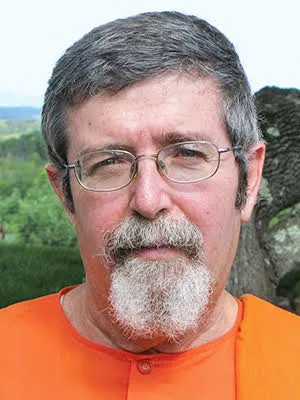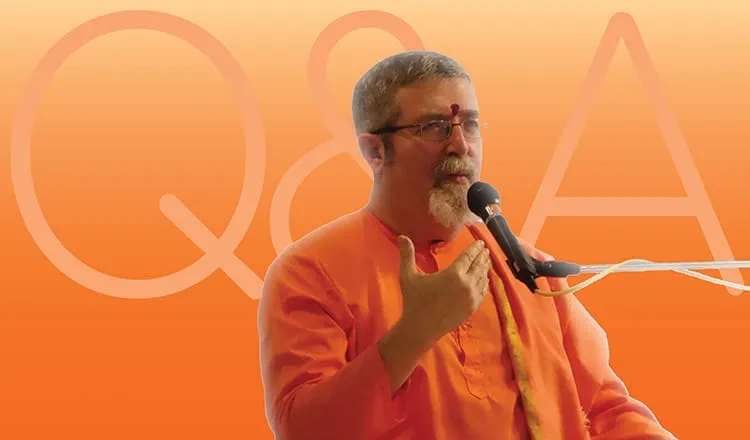Sivananda Bahamas Blog
Expand Your Horizons …
Our Blog
Yogis in the World: Q&A with Swami Swaroopananda
Audience Question: Does the yogic tradition refer or teach about a life within society, amidst relationships, etc. If so, what does it teach about it?
Swami Swaroopananda's Answer: To be honest with you, the yogic tradition does not teach about life within society. The yogic tradition actually teaches about at least temporarily withdrawing from society in order to discover who we truly are, to discover the nature of our true Self.
If we look at history, since time immemorial yogis went to the caves, they went to the forest. Some of them, some great yogis, did stay within society, like King Janaka. But, if you really look at the tradition, yogis were always searching for solitude as a part of their training.
In the 20th century, we start to see more and more yogis moving within society to be amongst the people in order to share the teachings of yoga. Why? Because they saw that there is such a need in the world. The world desperately needs these teachings. So what we have seen since the last quarter of the 19th century is quite extraordinary, yogis coming more and more into society in order to help humanity.
But the very nature of yoga requires solitude. Inner solitude, but also some portions of the practice and the teaching require external solitude. A yogi should be able to live a life of practice in solitude. This is in my opinion the truth. Even today, there are yogis who are living in solitude.
On the other hand we are also seeing society coming to the yogis. If you go to India, for example, Rishikesh — Swami Sivananda spoke about the beauty of Rishikesh, how beautiful the Ganges is, how beautiful the Himalayas are, the silence that prevails in Rishikesh. So many things the masters said about Rishikesh — but if you go today to Rishikesh, it's much busier. I remember when I went with Swamiji to Gangotri. Even Gangotri today is very busy. I would assume it also becomes more and more difficult for the yogis to find solitude.
So we see something interesting. The yogis are coming into society but also society is coming to the yogis. More and more people are interested in meeting the yogis, in learning the ancient teaching of yoga, of Vedanta. And it is happening at a very fast pace. For example, the ancient tradition speaks of at least 12 years of training under a guru. But nowadays we see different things, because society has changed so much.
Maybe it's not my place to say it, and I may be mistaken, but I think even in India there must be some visible change regarding the pace of life and people's attitudes. Nowadays people want everything instantly. People have no patience to go through the training. But, solitude cannot be evaded. It's a must. And we should not be afraid of it.
Swami Sivananda said, if you cannot go to a forest, turn your house into a forest. He was speaking about this very thing. Turn your own home into a forest. Even if you are in New York City, or wherever, turn your home into a forest. He emphasized having a meditation room in the home where you can go and meditate and do intense practice and be in solitude. Even in the city. And nowadays we are blessed with centers in the city, with ashrams close to the cities, good transportation, and easy communication.
The yogic knowledge, the yogic literature is quite accessible. Everything is quite easy. But, yogic knowledge is not in the computer. What is in the computer is in the computer. Yogic knowledge is within ourselves. So therefore, we cannot evade the issue that there is a need to meditate. There is a need to go deep within, there is a need to practice. This cannot be evaded. With all due respect to computers, we may need some solitude from the computers, from the smartphones. And in order to meditate, we need to learn to enjoy silence, to enjoy solitude, to not be afraid. Some people are afraid of solitude. And the manner by which we go deep, deep within never changed. It's the same.
Nowadays, Vedanta is also more accessible. And still, our teachings say that among the four yogas, the highest yoga is jnana yoga, the yoga of knowledge. Just as in the ancient times, the teaching is the same, it did not change. The literature is more accessible. It's easier to come into contact with teachers. But the practice is the practice, now, like before.
We simply need to adapt, adjust and accommodate, like Swami Sivananda said. The thing is this, for the benefit of society it is good to be a yogi. Because nowadays more than before even, yogis can help society. Swami Vishnudevananda's idea was become a yogi. Train yourself in the practices of yoga. Experience the teachings, then go out in the world and share with others, benefit humanity. Humanity needs it desperately. And this is what we do.
And Swamiji said that if you have a piece of cloth made of cotton and you want to change it into a piece of cloth made of silk, you need to change every single thread from cotton threads into silk threads. The individual threads are the individual beings. Society consists of individual beings. So if we want to initiate a change in society, there should be an initiation of change in the individual and it has to start with us, because how can I help others to change positively if I cannot help myself. How can I teach others to be peaceful if I am not peaceful, to meditate if I cannot meditate, to realize the Self if I am not a practitioner?
Therefore, Swami Vishnudevananda said, become a yoga practitioner, not a yoga preacher. Don't be a yoga teacher, be a yoga practitioner. Definitely when we teach we need to communicate, but what are we going to communicate? It's better to communicate what we are. So, the way we contribute to society is by practicing yoga and by teaching yoga. By learning Vedanta and by teaching Vedanta. Like this. By being trained in the ashram and then going out of the ashram, into the cities, in society, and sharing the knowledge of yoga with everyone.
You may know that the latest statistics show that about 1 billion people in the world are practicing yoga, some type of yoga. And if you speak with people who practice yoga, you will hear how much yoga benefits the human being. You will hear lots and lots and lots of stories of a positive nature. Especially when you hear the individual stories. Even here in the ashram. We are a few hundred people. If you speak with people you will hear how much yoga benefits them. It's tremendous.
The first Yoga Teacher Training Course happened in 1969. When Swami Vishnudevananda created the Yoga Teacher Training Course he had a vision. At that time, Swamiji had a vision of millions and millions and millions of people practicing yoga and learning the ancient science of yoga. And some people ridiculed him. Some people thought, "this is just imagination, how can it be?" At that time yoga, was considered to be a fringe type of science.
But, everything that Swamiji saw and said came true. In this organization alone, more than 40,000 people have been trained to become yoga teachers. In this organization alone, these yoga teachers have reached millions. Millions. And those millions are touching the lives of other people in their lives.
So I think you start to get an idea regarding the role of yogis within society. Now mind you, yoga is not just yoga asanas, pranayama, meditation and so on. The most fundamental yoga is karma yoga, serving our fellow beings selflessly, taking care of our fellow beings.
Swami Sivananda said, "Clothe the naked, feed the hungry, heal the sick." This was his teaching. So, yogis all around the world are helping so many people, so many children, so many hungry people, so many people who are in the middle of war. And they are giving hope to a humanity, which to a certain degree lost faith. And hope and faith are very necessary. We need to have conviction that humanity has a bright future. Then they can help others. This is what I have to say about the involvement of yogis within society.
*****
Recorded in April 2018 at an evening of Questions & Answers about Yoga and Spiritual Life that Swami Swaroopananda offers at the ashram. The transcript has been edited slightly for clarity.

Swami Swaroopananda is a senior disciple of Swami Vishnudevananda. A practicing yogi from a very young age, Swami Swaroopananda has dedicated his life to the practice and teaching of yoga. He taught in Yoga Teacher Training Courses around the world and is currently teaching advanced yoga philosophy courses and lectures internationally. He is Director of the Sivananda Ashram Yoga Retreat and acharya (spiritual director) for the Sivananda centers and ashrams in the Bahamas and the Middle East. He is a member of the Board of Directors of the International Sivananda Yoga Vedanta Centres.
Upcoming Courses
Swami Swaroopananda answers aspirants’ questions, clears troubled minds, and inspires listeners to advance on the spiritual path.
Swami Swaroopananda answers aspirants’ questions, clears troubled minds, and inspires listeners to advance on the spiritual path.
Celebrate a beautiful Easter morning on Paradise Island with traditional Easter singing, stories, and messages of hope.
Swami Swaroopananda answers aspirants’ questions, clears troubled minds, and inspires listeners to advance on the spiritual path.
Swami Swaroopananda answers aspirants’ questions, clears troubled minds, and inspires listeners to advance on the spiritual path.
Swami Swaroopananda answers aspirants’ questions, clears troubled minds, and inspires listeners to advance on the spiritual path.
Swami Swaroopananda answers aspirants’ questions, clears troubled minds, and inspires listeners to advance on the spiritual path.
Swami Swaroopananda answers aspirants’ questions, clears troubled minds, and inspires listeners to advance on the spiritual path.
Swami Swaroopananda answers aspirants’ questions, clears troubled minds, and inspires listeners to advance on the spiritual path.
Swami Swaroopananda answers aspirants’ questions, clears troubled minds, and inspires listeners to advance on the spiritual path.
Swami Swaroopananda answers aspirants’ questions, clears troubled minds, and inspires listeners to advance on the spiritual path.
During this special time of year we invite you to join us in celebrating wisdom, love, compassion, and the transcendence of artificial barriers.
Swami Swaroopananda answers aspirants’ questions, clears troubled minds, and inspires listeners to advance on the spiritual path.
Swami Swaroopananda answers aspirants’ questions, clears troubled minds, and inspires listeners to advance on the spiritual path.
Swami Swaroopananda answers aspirants’ questions, clears troubled minds, and inspires listeners to advance on the spiritual path.
Swami Swaroopananda answers aspirants’ questions, clears troubled minds, and inspires listeners to advance on the spiritual path.
Swami Swaroopananda answers aspirants’ questions, clears troubled minds, and inspires listeners to advance on the spiritual path.
Swami Swaroopananda answers aspirants’ questions, clears troubled minds, and inspires listeners to advance on the spiritual path.
Swami Swaroopananda answers aspirants’ questions, clears troubled minds, and inspires listeners to advance on the spiritual path.
Swami Swaroopananda answers aspirants’ questions, clears troubled minds, and inspires listeners to advance on the spiritual path.
Swami Swaroopananda answers aspirants’ questions, clears troubled minds, and inspires listeners to advance on the spiritual path.
Swami Swaroopananda answers aspirants’ questions, clears troubled minds, and inspires listeners to advance on the spiritual path.
Swami Swaroopananda answers aspirants’ questions, clears troubled minds, and inspires listeners to advance on the spiritual path.
Swami Swaroopananda answers aspirants’ questions, clears troubled minds, and inspires listeners to advance on the spiritual path.
Swami Swaroopananda answers aspirants’ questions, clears troubled minds, and inspires listeners to advance on the spiritual path.








